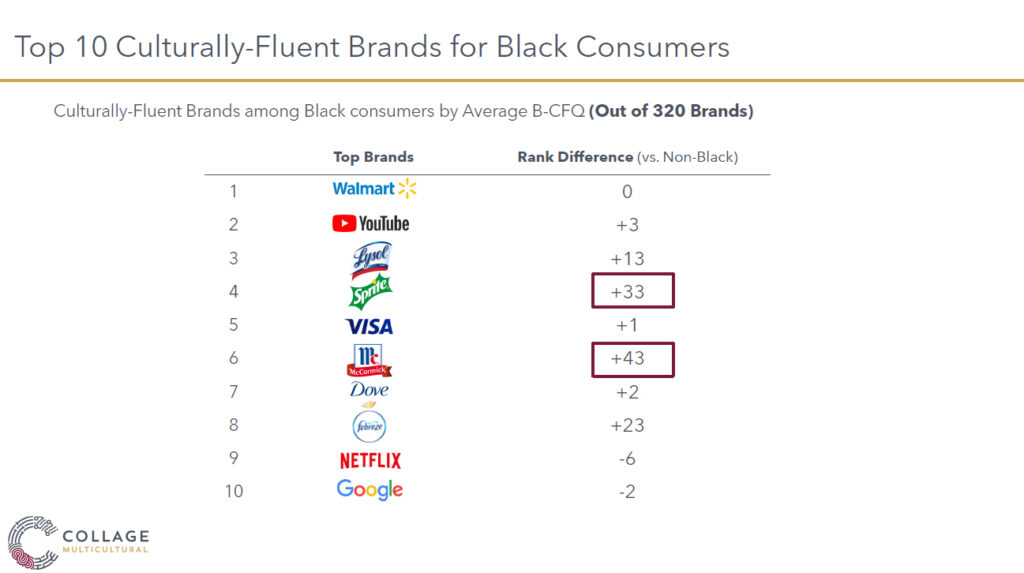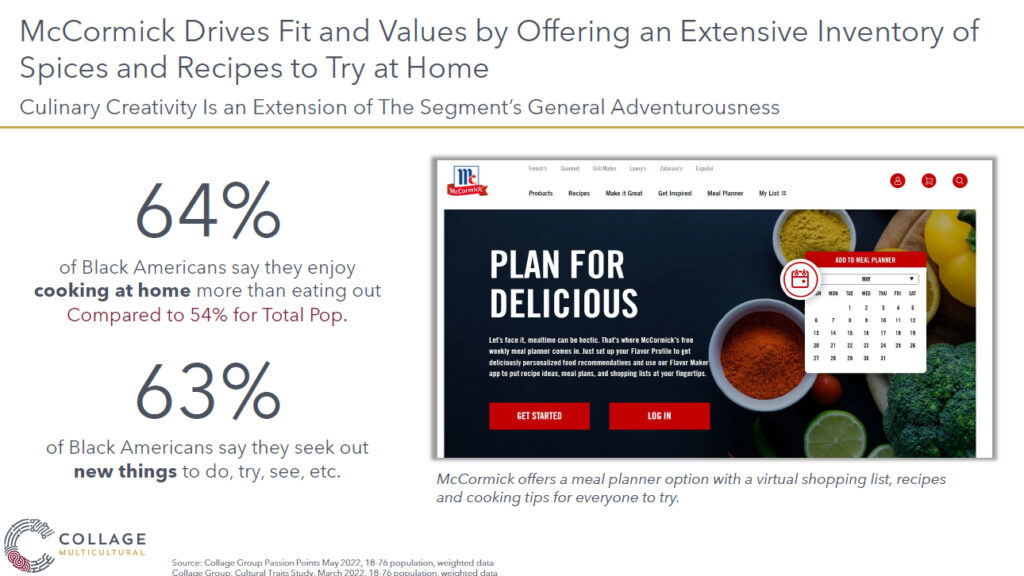Iconic American Brands Connect with Black Consumers Using Culture, Partnerships
New Collage Group insights identify the top 10 culturally fluent brands among Black Americans.
Our 2023 study measures how brands have been able to use culture efficiently and effectively to appeal to the Black segment. According to the findings, Walmart, YouTube, Lysol, Sprite, Visa, McCormick, Dove, Febreze, Netflix, and Google resonate the best among Black consumers.
These brands were so successful in connecting with Black America because they effectively engaged the passions of Black consumers. Each of the top brands displayed that they understand Black consumer values and made intentional efforts to engage and support them.
In these assessments, Collage Group uses the Brand Cultural Fluency Quotient (B-CFQ) score to determine brand resonance across six different cultural factors. The quotient takes into account Fit, Relevance, Memories, Values, Trust, and Advocacy.

McCormick, for example, put forth a winning campaign by tapping into Black interests and creativity. This approach was embraced by the Black community. The brand partnered with award-winning chef Millie Peartree, an African American woman famously known for her tasty dishes and affordable recipes.
Through the partnership, McCormick acknowledged the history and prominence of soul food by transforming traditional charcuterie boards into “Soul-Cuterie” boards in celebration of Black History Month 2022.
McCormick also teamed up with another popular African American food influencer, Tabitha Brown, working with her to form her own seasoning line. Pairing with these two women – Peartree and Brown – helps McCormick connect with the Black community on the point of Relevance.
Beyond that, an extensive inventory of seasonings and recipes drives Fit and Values, while the commitment to celebrating Black traditional soul foods, further ties into Values, as well as Memories, and Advocacy.
Sixty-four percent of Black Americans express that they find joy in cooking at home versus eating out, compared to 54% of the population. Furthermore, 63% of Black Americans say they seek new things to do, try, and see, including new foods and meals.
From a social media perspective, 88% of Black consumers follow influencers or content creators on social media platforms, while 42% of the segment follows food and cooking influencers/ content creators. McCormick’s campaign was a huge success with these Black social media users.

Walmart’s efforts to connect with Black consumers also garnered a positive reaction among the Black community. Walmart’s approach is related to the brand’s focus on affordability and its commitment to uplifting Black Americans as a whole.
We know Black consumers have expressed concern about their financial circumstances, and recognize an overwhelming majority of Black Americans want brands to do something to combat social and political issues. Walmart directly acted on these desires, and as a result, won over many of these consumers.
To that point, 72% of Black Americans are worried about their finances and 83% have called on brands to be involved in social issues in some respect. In response, for Walmart+ members, Walmart instituted free shipping on online orders, and withdrew delivery fees on orders totaling at least $35. The brand also invested in a $2 million grant in the name of racial equity, plus another $3.3 million in criminal justice reform.
Walmart’s emphasis on savings connects to Fit and Values. Additionally, the brand’s ongoing efforts to invest in Black enrichment, and taking a stance on social matters, connects on Relevance and builds Trust. These actions, among other endeavors in support of the Black community, helped make Walmart the number one brand among Black consumers.
Sprite put forth the “Sprite Limelight musical campaign” featuring Hip-Hop artist Coi Leray, and the endeavor was largely enjoyed and welcomed by Black consumers. Black Americans have a long-lasting relationship with Hip-Hop, as it has played a significant role in the evolution of Black culture.
To that point, 54% of Black Americans say they are more likely to listen to Hip-Hop music (including rap) compared to 33% for the total population. Moreover, 34% of the Black segment enjoys consuming music that is part of their cultural heritage. So, when Sprite interjects this genre within their commercials, it is not surprising that Black consumers have a favorable reaction. The Limelight ads in particular, in featuring Hip-Hop music, connect with Black Americas on Memories, Advocacy, Fit, Trust and Values.
Sprite has an impressive record of amplifying the voices of Black musicians and promoting Black athletes. This history helps the brand ultimately gain loyalty among Black consumers, activating Memories, Advocacy and Trust.